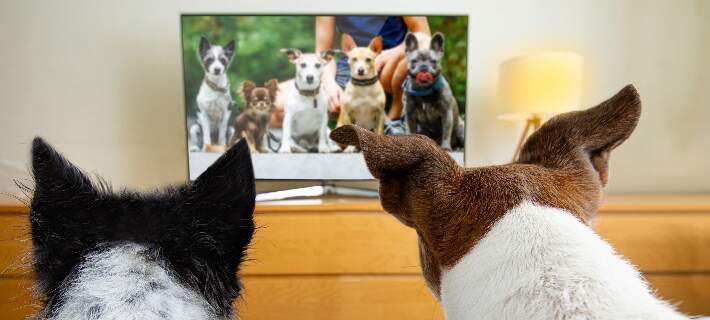Have you ever caught your furry friend staring intently at the TV screen, seemingly engrossed in the latest drama or nature documentary? It’s a common sight for many dog owners, leading to the question: Can dogs really understand what’s happening on TV? Let’s dive into this intriguing topic!
1. Visual Perception in Dogs
- Dogs don’t see TV the same way we do. Their visual perception is different, with a preference for certain colors and motions. They are more attracted to moving objects and can be particularly interested in shows featuring animals or nature scenes.
2. The Role of Sound
- Dogs have a keen sense of hearing. The sounds from the TV, like barking or other animal noises, can grab their attention. Some dogs may respond to these sounds as if they were real-life cues, barking back or becoming alert.
3. The Curiosity Factor
- Just like humans, dogs can be curious creatures. The flickering lights and moving images on a TV screen can be fascinating to them, prompting a sense of curiosity and interest.
4. Memory and Recognition
- Dogs have the ability to remember and recognize images and sounds. If they regularly see certain animals or people on TV, they might start showing recognition, which explains why some dogs react to specific TV characters or ads.
5. Breed Differences
- Some breeds may be more inclined to watch TV than others. Breeds with a high prey drive, for instance, might be more interested in watching nature documentaries with moving animals.
6. TV as a Companion
- For dogs that spend a lot of time alone, the TV can act as a companion. The sounds and images can provide comfort and a sense of presence, reducing feelings of loneliness.
7. Training and Conditioning
- Dogs can be conditioned to watch TV. If they associate TV watching with positive experiences, like cuddles or treats, they’re more likely to show interest in what’s on the screen.
8. Understanding vs. Reacting
- While dogs may react to what they see on TV, it doesn’t necessarily mean they understand it as humans do. Their interest is often more about the sensory experience rather than following a storyline.
Conclusion: While dogs may not understand TV shows in the way humans do, they can certainly engage with and react to what they see and hear on the screen. Whether it’s the movement, sounds, or simply the comfort of the routine, our canine companions do seem to enjoy a good TV session, each in their own unique way.

